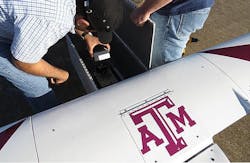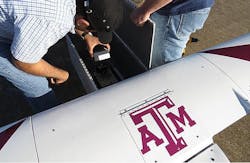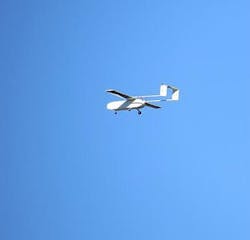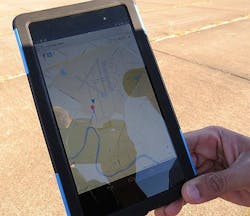FreeFlight Systems tests RANGR ADS-B system for UAS airspace integration test program
WACO, Texas, 21 Nov. 2014. Engineers at Texas A&M Engineering Experiment Station’s (TEES) Vehicle Systems & Control Laboratory (VSCL) have installed and flown the FreeFlight Systems RANGRADS-B Universal Access Transceiver (UAT) system on their Pegasus II unmanned aircraft system (UAS)—an historic first for a certified ADS-B UAT system to receive FAA approval to be flown on a UAS.
The program is led by Dr. John Valasek, VSCL Director, and is researching new technologies for integrating unmanned systems into the National Airspace System (NAS).
The RANGR ADS-B transceiver is a TSO-approved, rule-compliant solution deployed primarily in light general aviation aircraft. The version flown was configured with an internal WAAS/GPS and supported both ADS-B Out and ADS-B In capabilities. Just 5 x 5.75 x 1.7 inches high and weighing less than 1 pound, the system is well suited for space- and weight-sensitive UAS installations. The Pegasus II UAS flown in the program is a 100-pound class, 12-foot wingspan vehicle with a payload bay measuring 23 x 12 x 12 inches and a payload capacity of 25 pounds.
“The TEES research is vital for integrating UAS safely into the airspace system and has far-reaching technology, regulatory and economic impacts for the entire country,” says Tim Taylor, CEO of FreeFlight Systems. “We’re honored to be the first certified 978 UAT solution to be approved and flown in support of this important work. As the FAA moves toward developing rules and standards for this rapidly growing segment of aviation in 2015, certified ADS-B solutions are an important part of safe integration.”
The research is funded by the TEES’ Technical Assistance Program (TAP), which forms partnerships with private industry that encourage innovation and economic growth in Texas. TAP links small businesses in Texas to the broad spectrum of engineering and technology research capital within The Texas A&M University System and its partner network statewide. It provides low-cost technical assistance for small businesses to find solutions to their technical challenges, such as increasing operational efficiency, developing new market strategies for their technologies, evaluating and improving manufacturing processes, and facilitating partnerships that encourage innovation.
“The FreeFlight Systems ADS-B solutions are a great fit for the UAS’s used in the VSCL research program,” says Dale A. Cope, PhD, director of industry assistance at TEES. “The Irving-based company also brings a combination of engineering expertise as well as avionics development, certification and operational experience that will assist us in this pioneering and important research.”
FreeFlight Systems designs and manufactures high-performance avionics for flight safety and for delivering substantial safety, cost, environmental and other benefits from the NextGen airspace transformation. Founded in 2001 and based in Texas, the company pioneered the first certified aviation WAAS GPS receiver and the first rule-compliant UAT ADS-B system.



